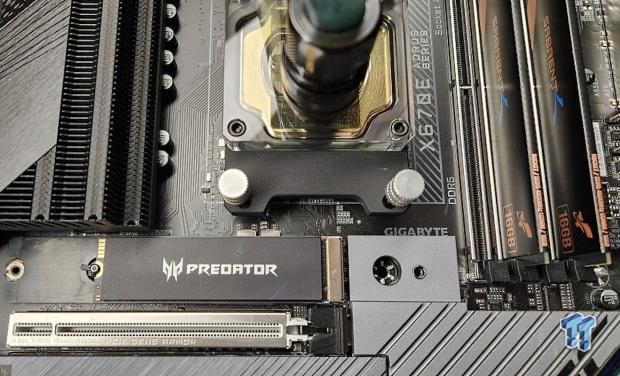
The Bottom Line
Pros
- + Pricing
- + Consumer workloads
- + Low QD random
Cons
- - None
Should you buy it?
AvoidConsiderShortlistBuyIntroduction & Drive Details
Over a year ago, we got our first taste of an Acer SSD via its prestigious Predator brand. Acer's Predator GM7000 2TB turned out to be one of the better performing SSD we'd tested at the time, although it lagged noticeably behind many of its contemporaries due to its being arrayed with 96L Micron that was reaching EOL status.
Keeping the Predator competitive despite its inherent disadvantage of being arrayed with 96L Micron at the time is the very same controller that powers the updated model we have today. InnoGrit's IG5236 "Rainier" 8-channel controller is one we've come to recognize as among the very best PCIe Gen4 SSD controllers ever made. This controller, when paired with great firmware and high-performing flash, is hard to beat, as exemplified by the SSD we have on our test bench today.
The Predator GM7000 is a collaborative effort between Acer and BIWIN. BIWIN builds SSDs, many of which are sold under major OEM names like HP, so this team effort makes perfect sense. BIWIN brings the ability and expertise to manufacture SSDs, and Acer brings its prestigious Predator branding. Additionally, BIWIN is now rivaling the flash packaging capabilities that were previously only attainable in a practical fashion by billion-dollar flash fabs. A huge achievement for BIWIN is enabling exactly what we have here today, a four-package B47R arrayed 4TB M.2 SSD.
Now, as mentioned in the above summary, it is indeed still a rare occurrence when we get a 4TB SSD in for review. In fact, up to now, and as it relates specifically to blazing-fast PCIe Gen4 consumer SSDs, we've only reviewed E18-controlled 4TB SSDs. Naturally, we are excited to see what an IG5236-controlled 4TB SSD can deliver, as this controller has proven to be, gaming aside, superior to Phison's E18.
At this point, we feel compelled to mention that all capacity points of Acer's Predator GM7000 series are now arrayed with Micron's 176L B47R flash. If you buy a Predator SSD, you get the good stuff. We mention this because sequential throughput for Micron 96L and 176L flash are exactly the same, which could potentially cause confusion for the average consumer.
Additionally, we need to point this out. On our charts, we have the 2TB EOL 96L arrayed version of the GM7000, which is ideal for comparing the newly arrayed model to its first iteration but could potentially cause the reader to assume the current 2TB model is lesser performing because its nomenclature has remained the same.
Drive Details
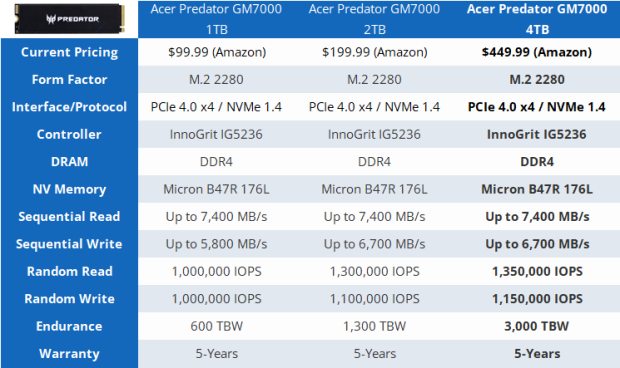
The pricing for the 4TB model is exceptional. 4TB of Micron B47R goodness for $450? Yes, please.
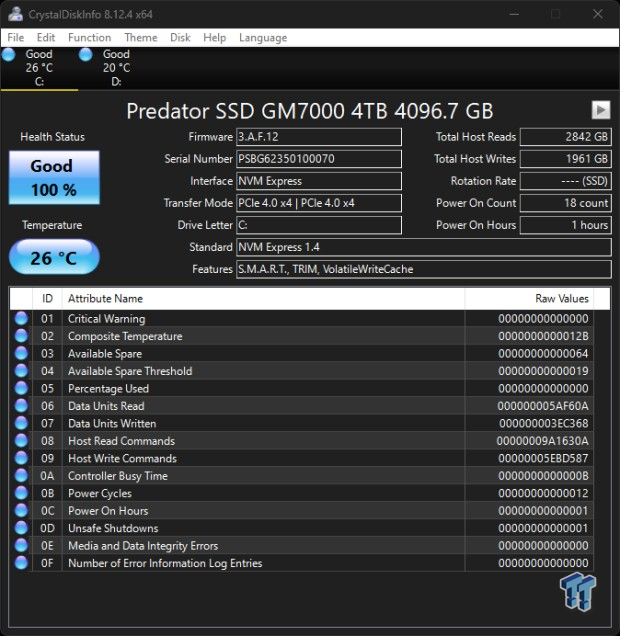
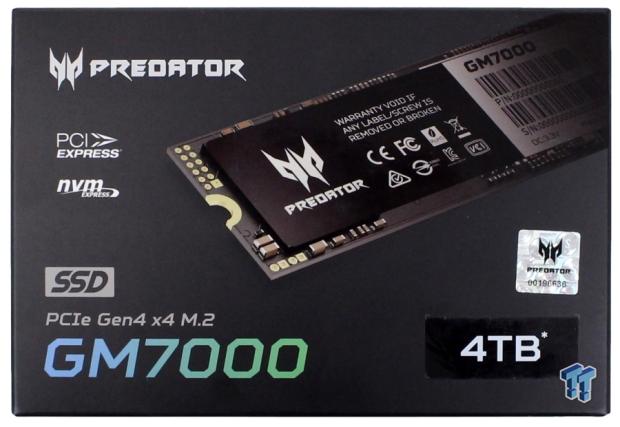
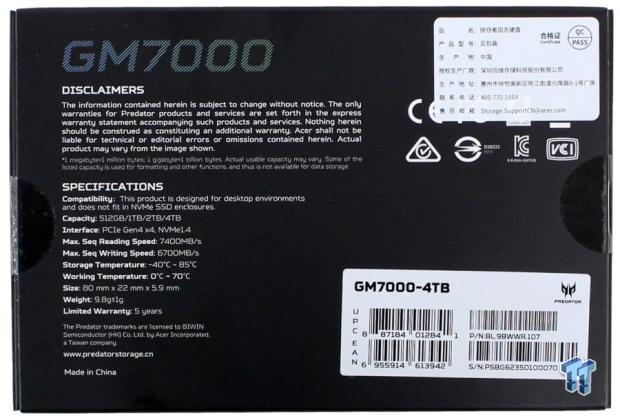


The drive features Acer's one-of-a-kind graphene-infused foam heat spreader. This unique heat spreader is surprisingly effective at taming thermals, keeping the drive running up to 18c cooler than without. Additionally, and worth noting, this heat spreader label is compressible and can be used in conjunction with motherboard and PS5 heatsinks. As a nice value add, Acer makes available free for use with its SSDs, a copy of Acronis OEM. Click here to download it.
Jon's Test System Specifications
Intel Test System
- Motherboard: ASUS ROG Z690 HERO
- CPU: Intel Core i9-13900K - Buy from Amazon
- Cooler: Alphacool Eissturm Hurricane Copper 45 - Buy from Amazon
- RAM: Sabrent Rocket DDR5 32GB - Buy from Amazon
- Graphics Card: MSI SUPRIM X RTX 3080 12GB - Buy from Amazon
- Case: PrimoChill's Praxis Wetbench - Buy from Amazon
- Power Supply: be quiet! Dark Power Pro 12 1200W - Buy from Amazon
- OS: Microsoft Windows 11 Pro 64-bit - Buy from Amazon
AMD Test System
- Motherboard: GIGABYTE X670E AORUS Master
- CPU: AMD Ryzen 5 7600X - Buy from Amazon
- Cooler: Alphacool Eissturm Hurricane Copper 45 - Buy from Amazon
- RAM: Sabrent Rocket DDR5 32GB - Buy from Amazon
- Graphics Card: MSI SUPRIM X RTX 3080 12GB - Buy from Amazon
- Case: PrimoChill's Praxis Wetbench - Buy from Amazon
- Power Supply: be quiet! Dark Power Pro 12 1200W - Buy from Amazon
- OS: Microsoft Windows 11 Pro 64-bit - Buy from Amazon
Because we at TweakTown like to be first at everything whenever we can, we are going to present our storage performance results for the test subject on both 13th Gen Intel and 7000 Series AMD platforms going forward for the foreseeable future. Because Intel still delivers the best real-world storage performance, (Look Here), our running chart will continue to be Intel-based until AMD can deliver better real-world storage performance than its rival.

Sony PlayStation 5 - M.2 Storage Expansion
PS5 Read Performance
With Sony's wildly popular PlayStation 5 console now enabled for M.2 NVMe SSDs to be used as fast storage expansion, we include results for PS5 compatible SSDs we test as a part of our reviews going forward.
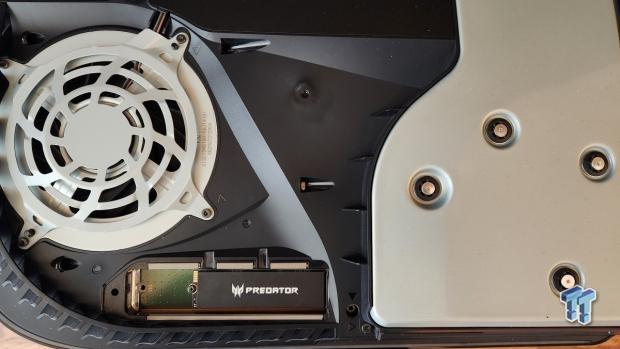
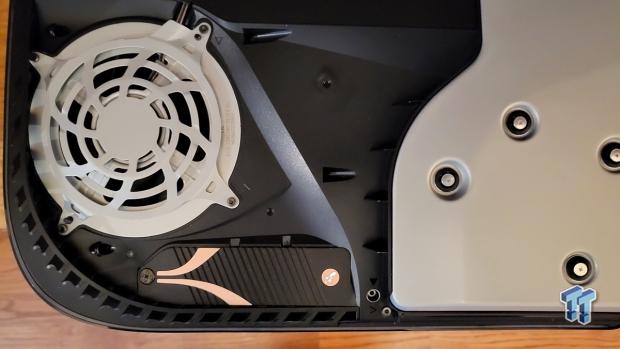
For 5,500 MB/s plus capable SSDs that don't have an adequately sized PS5 compatible heatsink or other SSDs where the heatsink provided doesn't fit right and can be removed, we both use and recommend Sabrents unparalleled PS5 heatsink available here.
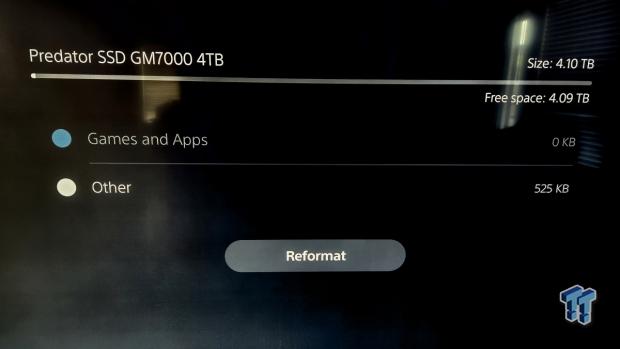
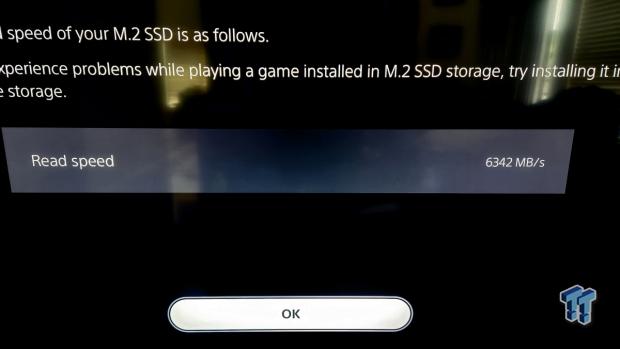
We only chart SSDs that can deliver a minimum of 5,500 MB/s read, which is Sony's original recommendation.
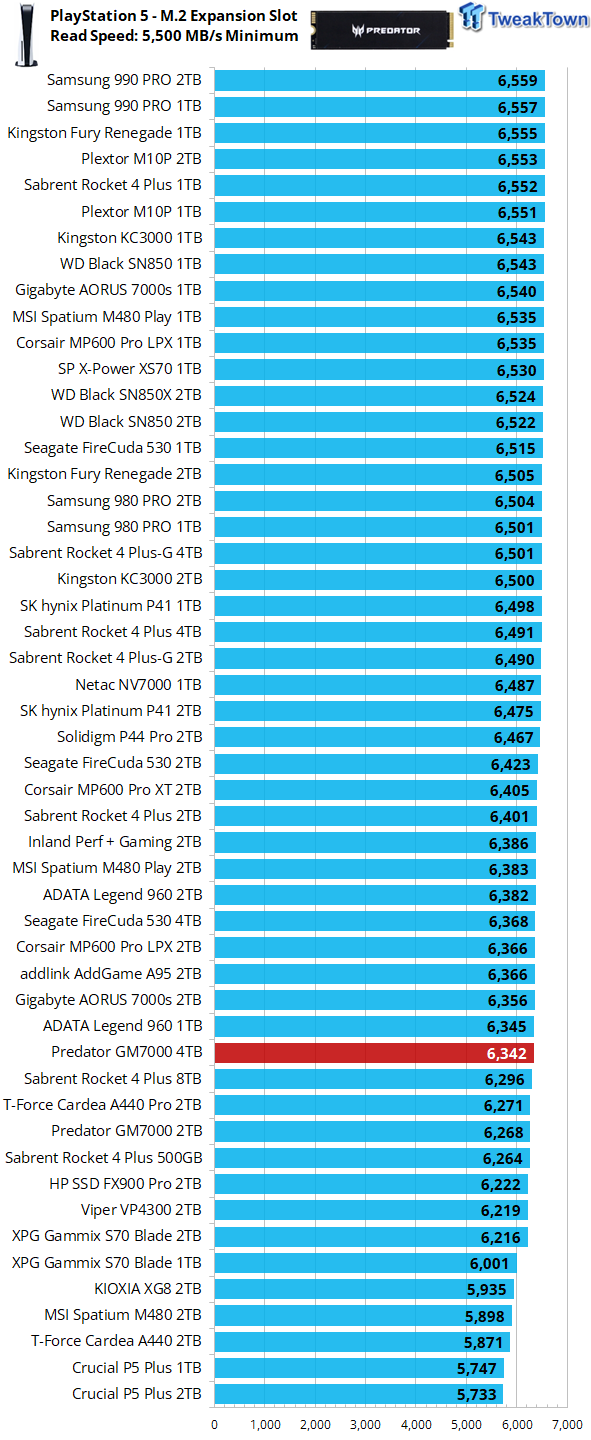
At 6,342 MB/s read performance, the newly arrayed GM7000 offers not only a nice improvement over its predecessor but also delivers the best performance we've noted to date for an IG5236-controlled SSD arrayed with B47R flash. Excellent.
Synthetic Benchmarks: CDM, Anvil, ATTO
CrystalDiskMark
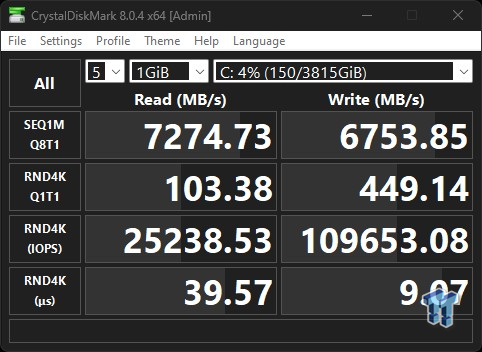
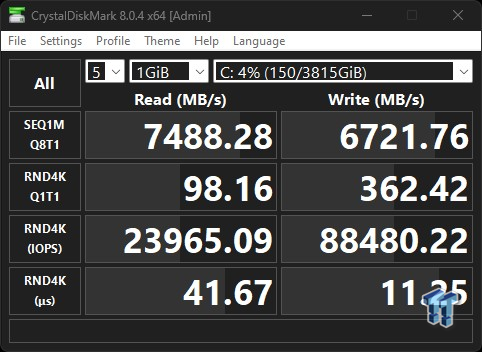
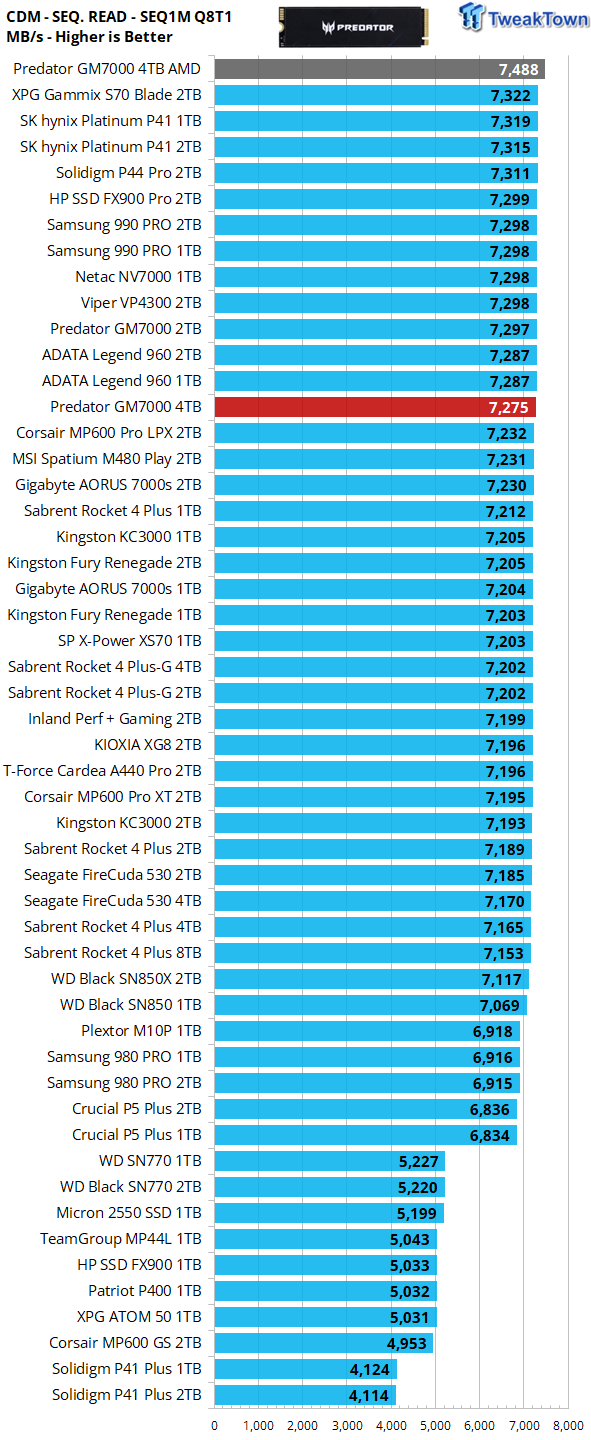
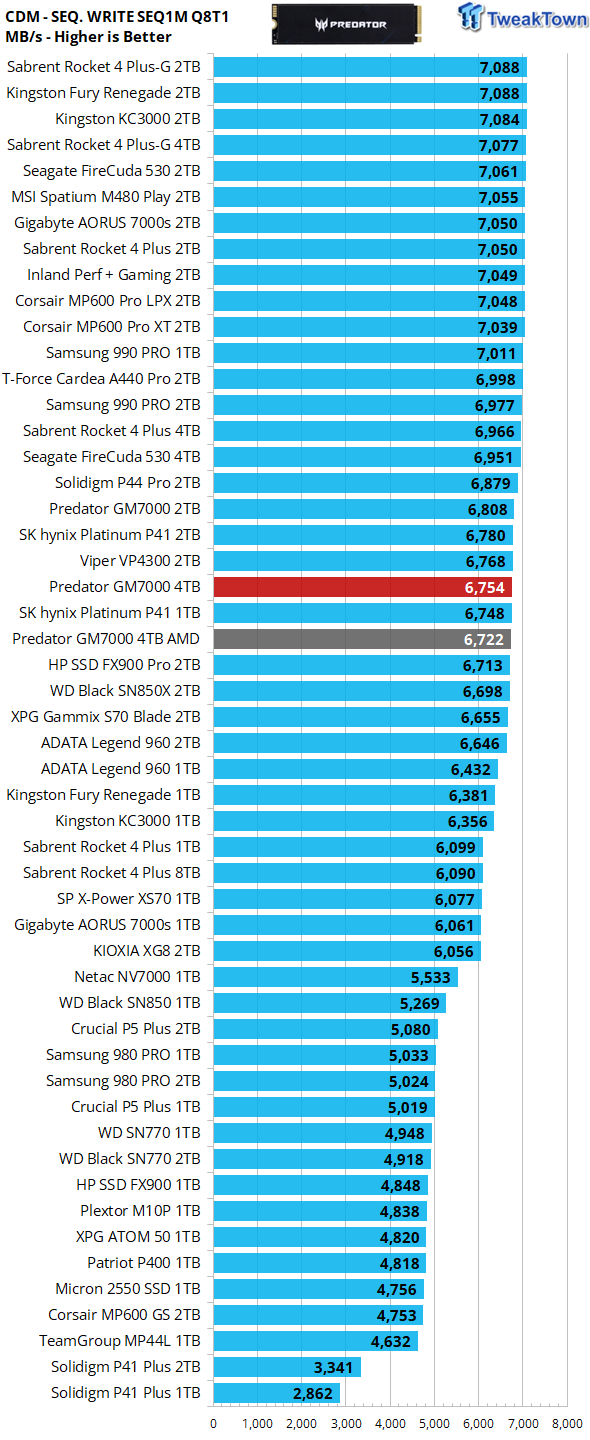
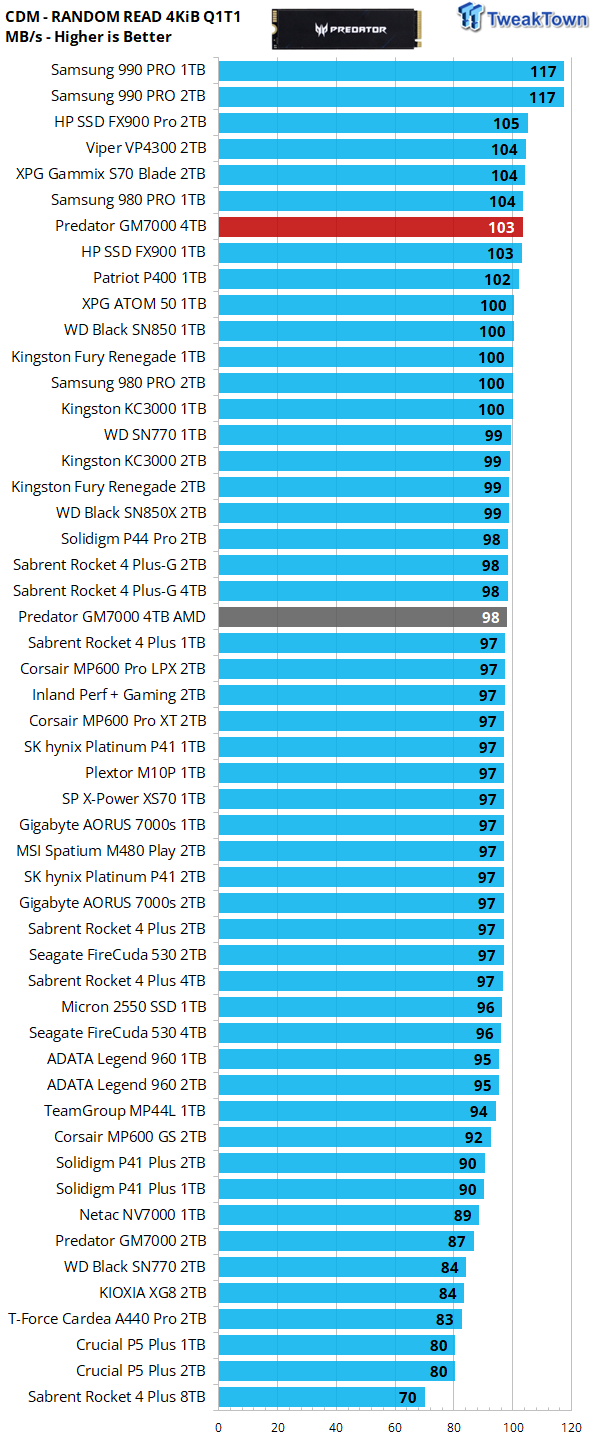
AMD continues to deliver the highest sequential throughput, so it's no surprise to see the lone AMD result at the top of our Intel-based chart. Acer specs its Predator GM7000 capable of up to 7,400 MB/s sequential read throughput, quite obviously when paired with an AMD-based platform, and we find that easily achievable with our AMD hardware.
If we dissect our sequential results a bit by comparing our newly arrayed test subject to its 2TB predecessor, we find both delivering approximately the same sequential throughput, just as we alluded to previously.
Moving to the all-important Q1T1 random read chart, we see exactly what makes our test subject perform so much better than its predecessor. Unlike sequential throughput, this is performance that matters. Impressive.
Anvil's Storage Utilities
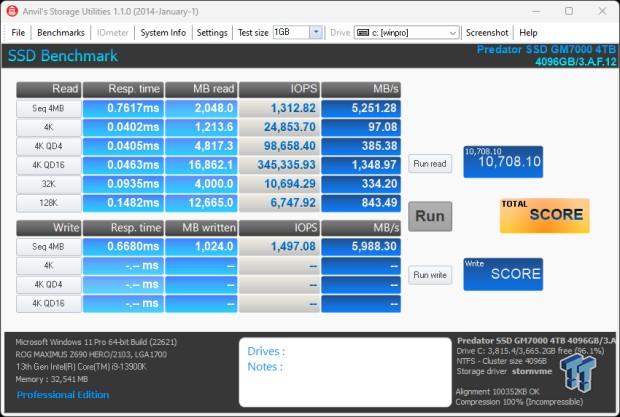
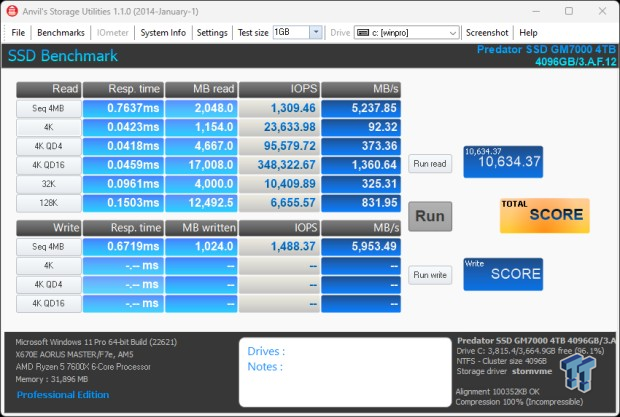
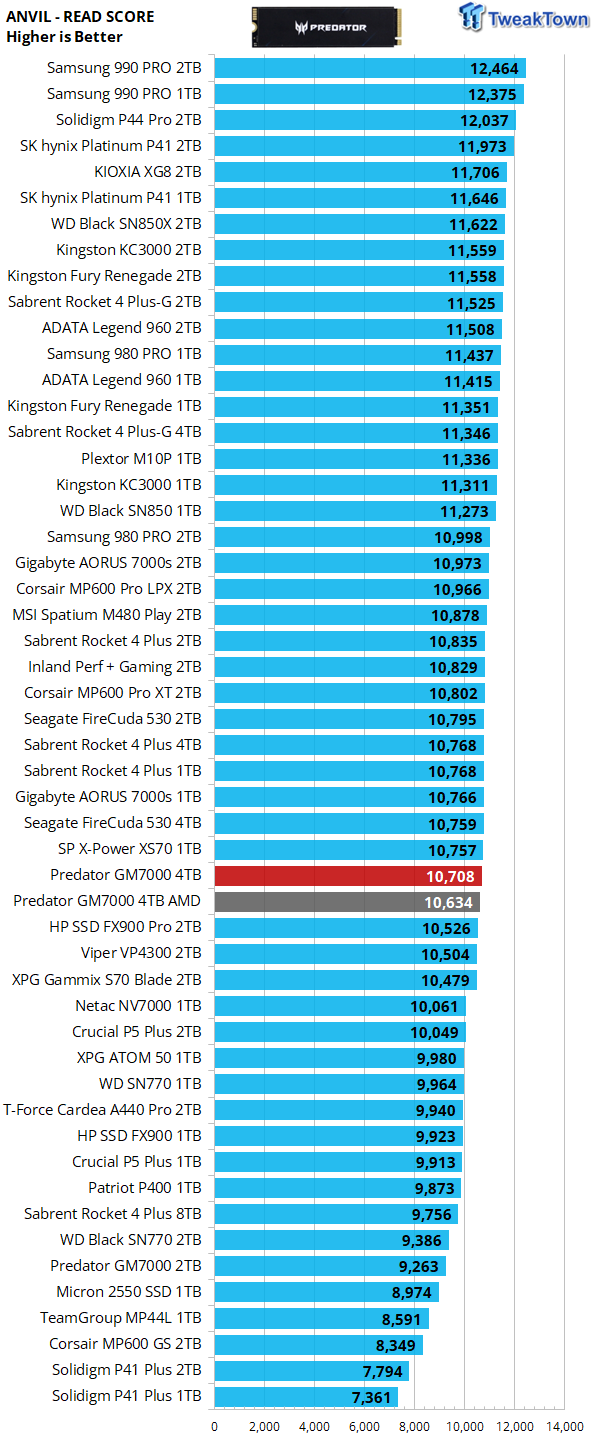
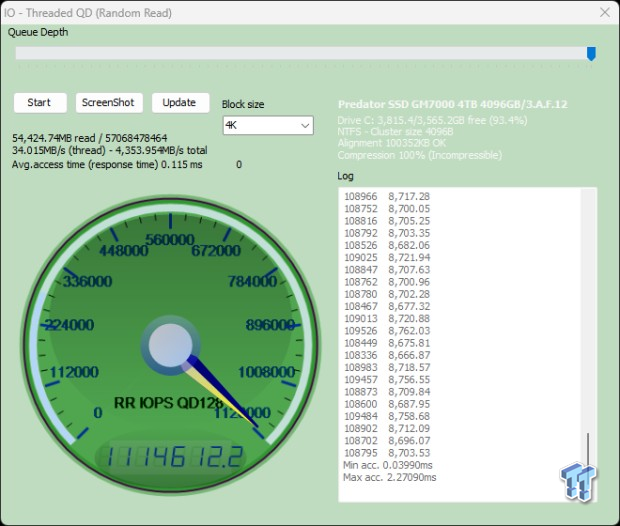
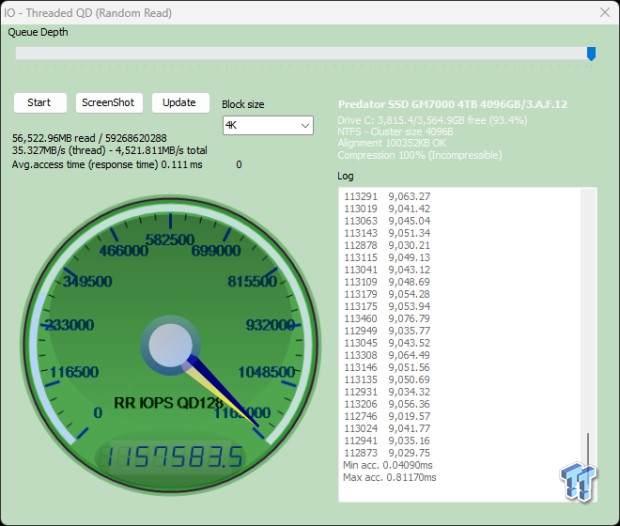
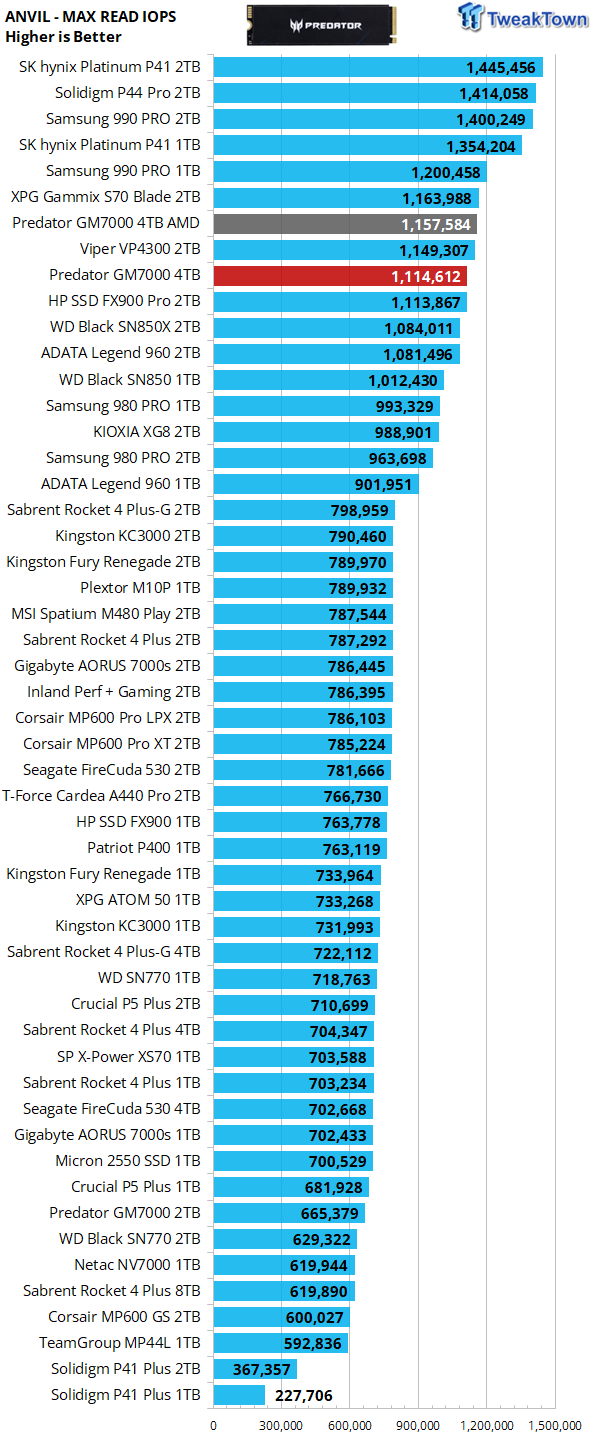
With the exception of Plextor's M10P, IG5236-controlled SSDs have never scored very well here. Even though our test subject doesn't sit very high on our scoring chart, the results are notable because, again, our test subject offers not only a nice improvement over its predecessor, but it also delivers the best performance we've noted to date for an IG5236 controlled SSD arrayed with B47R flash. Nice.
Max random read performance is outstanding at close to double that of its predecessor. This is, again, performance that matters.
ATTO
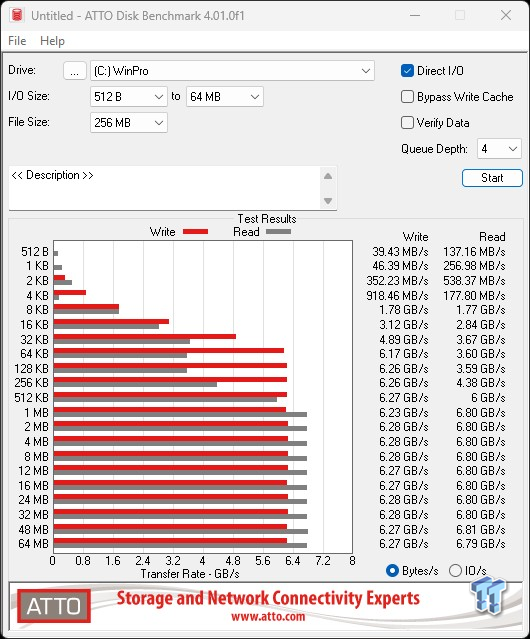
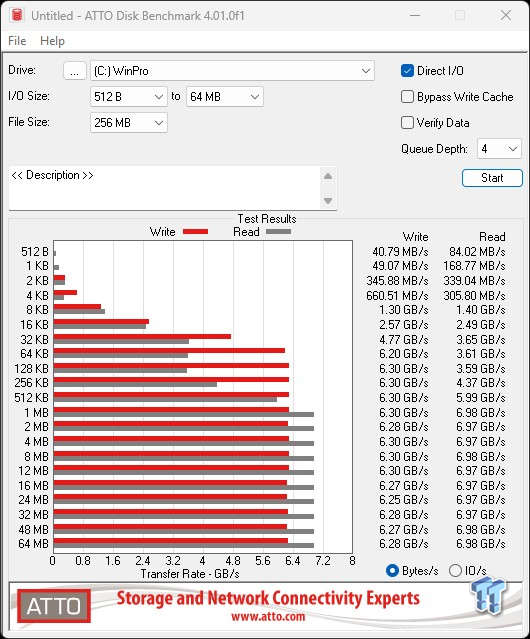
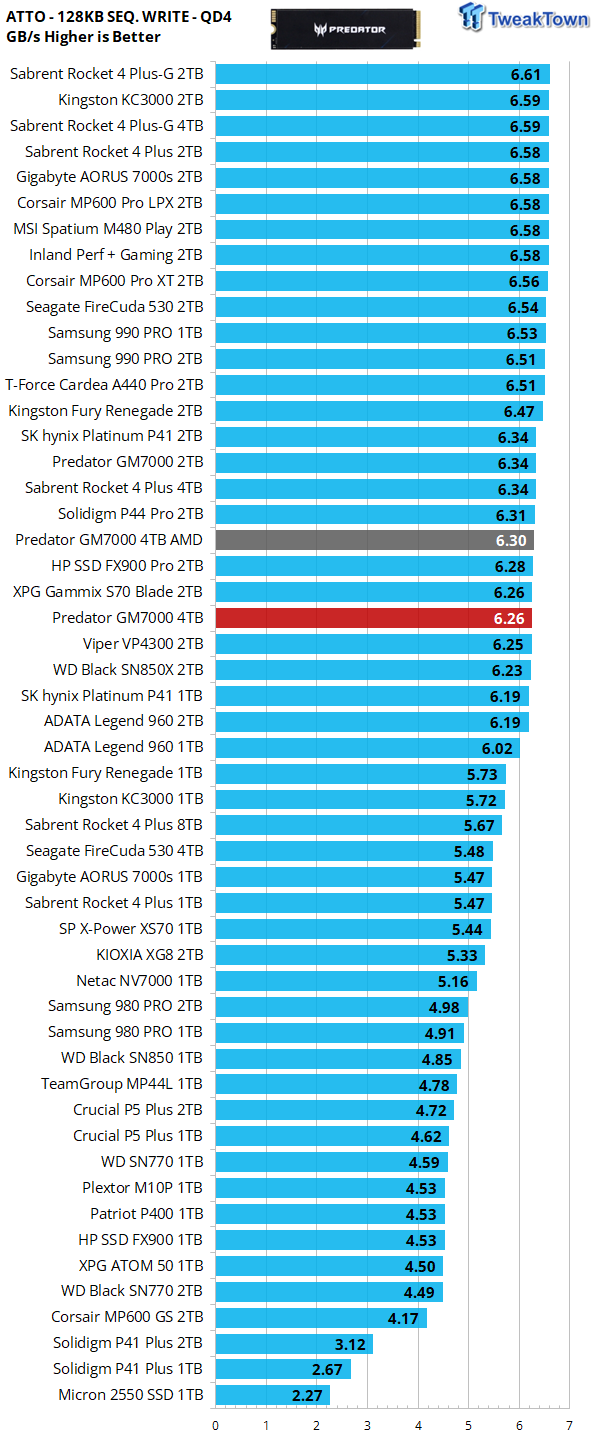
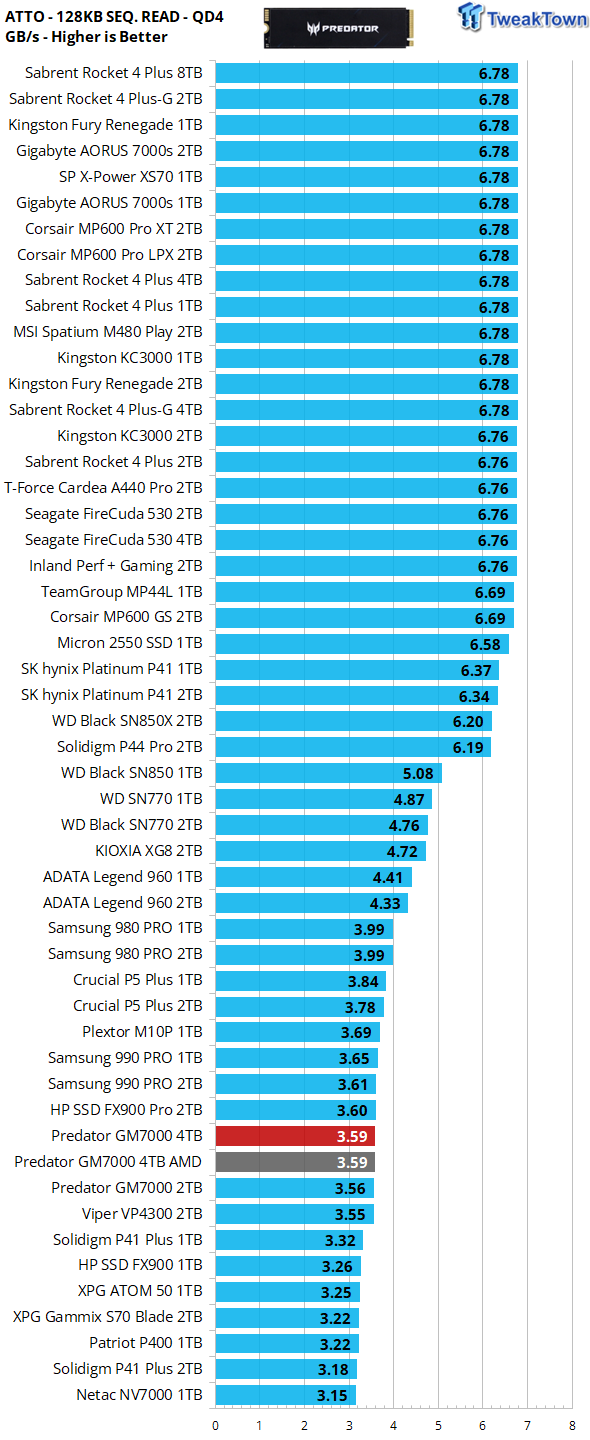
More than anything else, ATTO gives us a clear picture of what transfer sizes a particular SSD favors in terms of sequential throughput. The Predator GM7000 favors sequential transfers of 1MB or larger when serving data to the host or when programming data.
Real-World Testing: Transfers, 3DMark SSD Gaming Test, PCM10 Storage
Transfer Rates
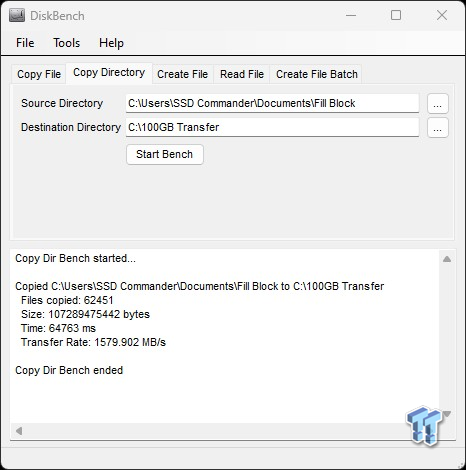
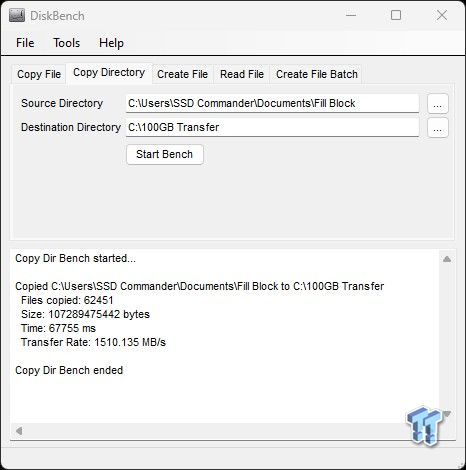
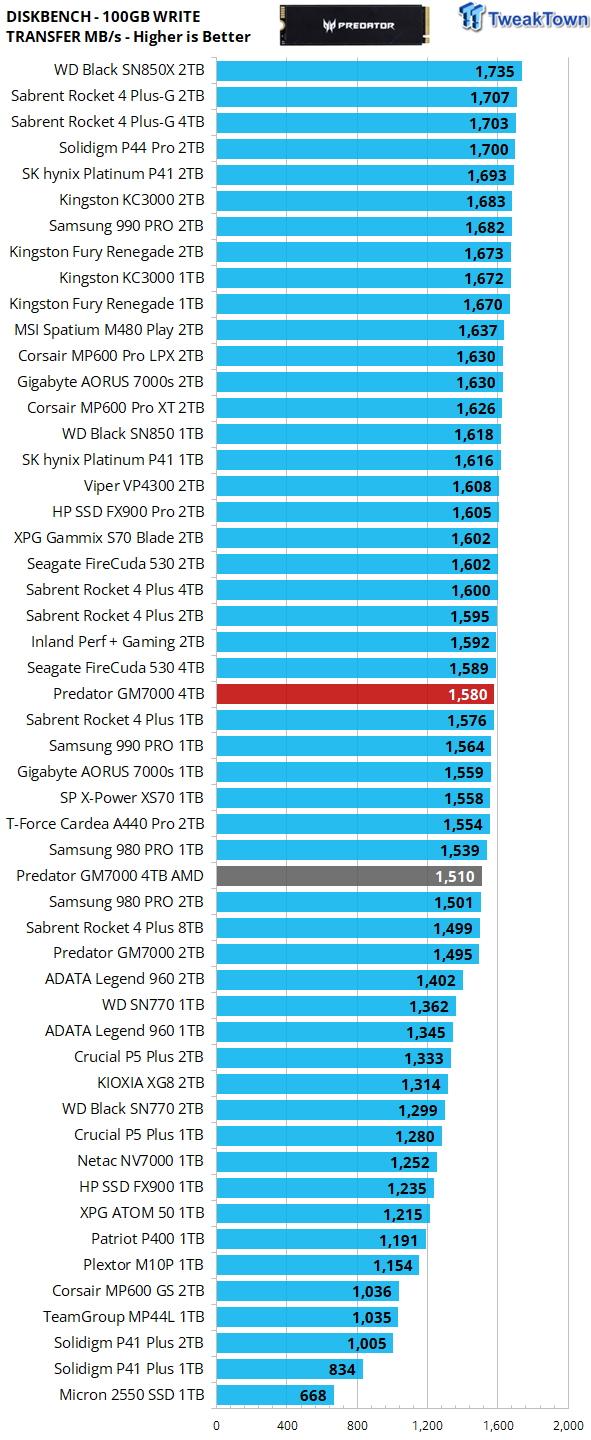
Our 100GB data transfer test is not your ordinary 100GB of data. Ours is a crushing mix composed of more than 62K files. Write performance random or sequential, is an infrequent operation, and as such, we do not consider it to be an important performance metric in the consumer space. An example being how many times is a game installed vs. how many times it's played. 1,580 MB/s midrange here, but still plenty good enough for our liking.
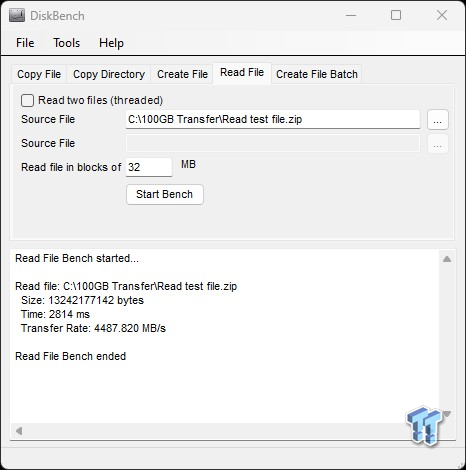
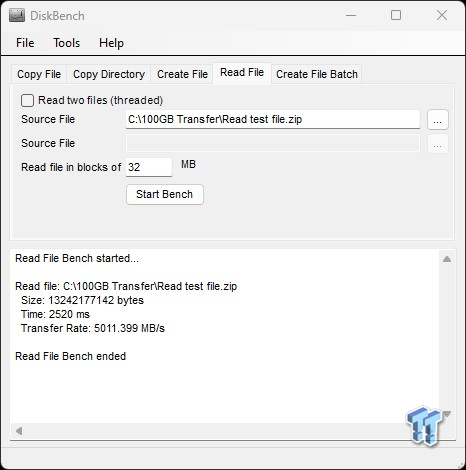
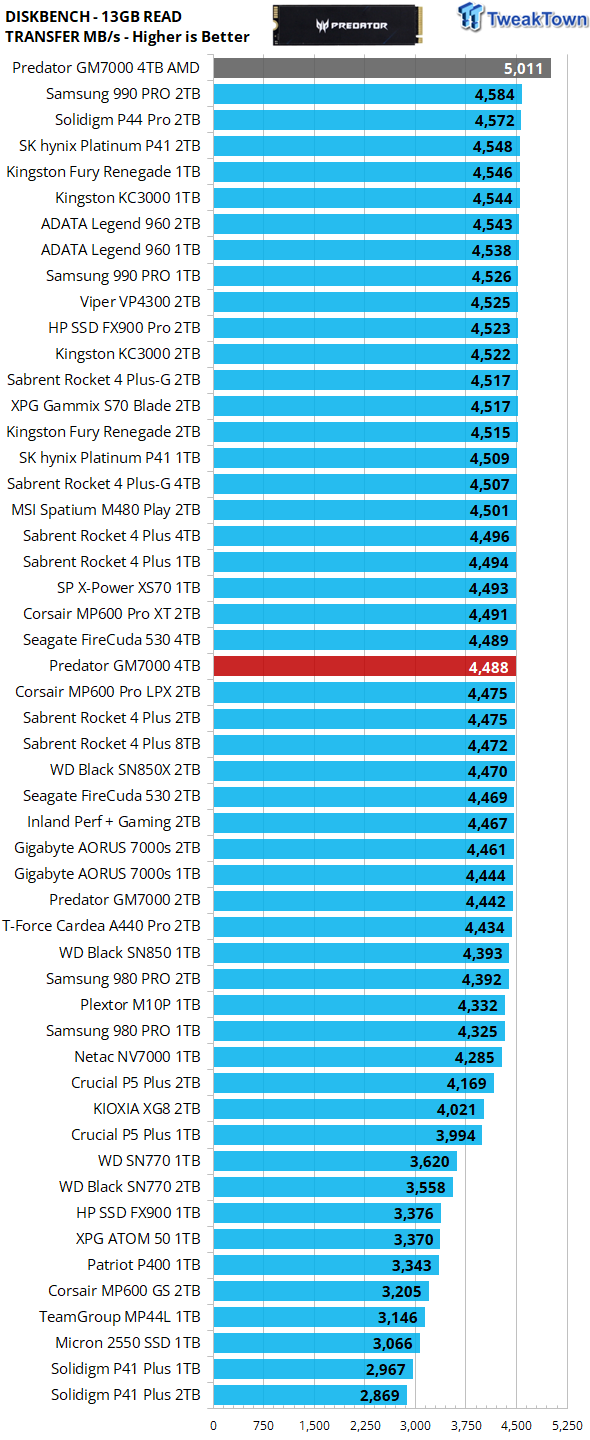
Again, plenty good enough for our liking.
3DMark SSD Gaming Test
UL's newest 3DMark SSD Gaming Test is the most comprehensive SSD gaming test ever devised. We consider it superior to testing against games themselves because, as a trace, it is much more consistent than variations that will occur between runs on the actual game itself. This test is in fact the same as running the actual game, just without the inconsistencies inherent to application testing.
In short, we believe that this is the world's best way to test an SSDs gaming prowess and accurately compare it against competing SSDs. The 3DMark SSD Gaming Test measures and scores the following:
- Loading Battlefield V from launch to the main menu.
- Loading Call of Duty Black Ops 4 from launch to the main menu.
- Loading Overwatch from launch to the main menu.
- Recording a 1080p gameplay video at 60 FPS with OBS (Open Broadcaster Software) while playing Overwatch.
- Installing The Outer Worlds from the Epic Games Launcher.
- Saving game progress in The Outer Worlds.
- Copying the Steam folder for Counter-Strike Global Offensive from an external SSD to the system drive.
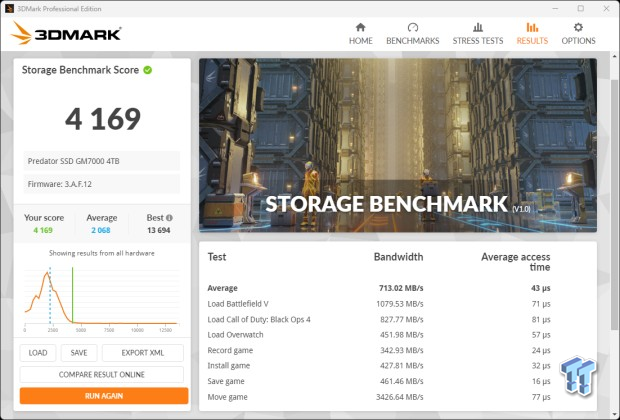
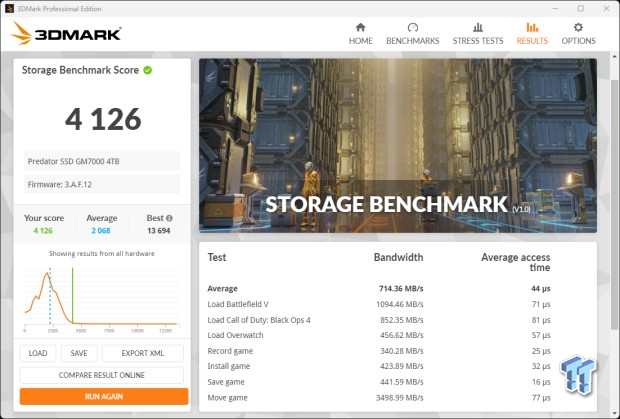
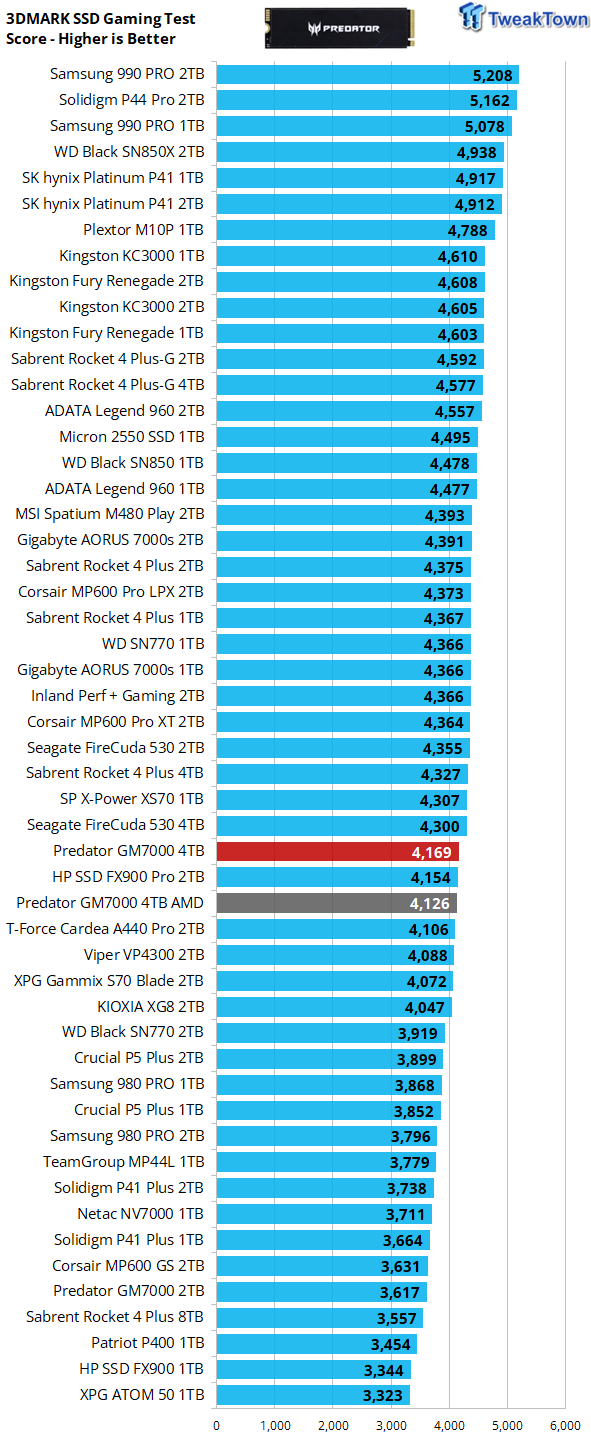
Gaming is a performance metric that matters to the majority of DIY consumers, especially to the enthusiast crowd that TweakTown caters to. Yet again, plenty good enough for our liking and a bit more impressive when we take note that this is the best result we've obtained from a B47R arrayed IG5236 controlled SSD.
PCM10 Storage Tests
PCMark 10 Storage Test is the most advanced and most accurate real-world consumer storage test ever made. There are four different tests you can choose from; we run two of them.
The Full System Drive Benchmark and the Quick System Drive Benchmark. The Full System Drive Benchmark writes 204 GB of data over the duration of the test. The Quick System Drive Benchmark writes 23 GB of data over the duration of the test. These tests directly correlate with mainstream user experience.
PCMark 10 Full System Drive Benchmark
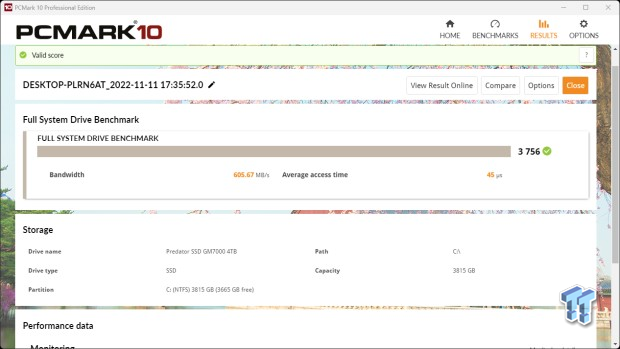
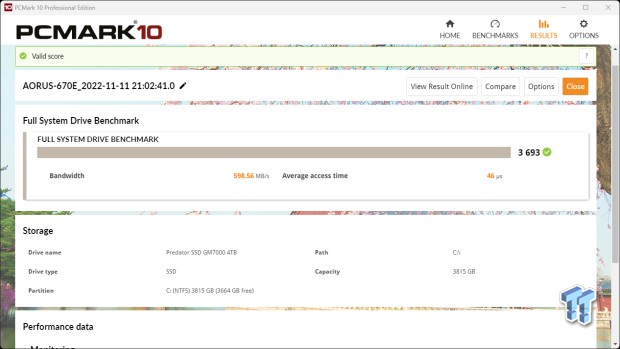
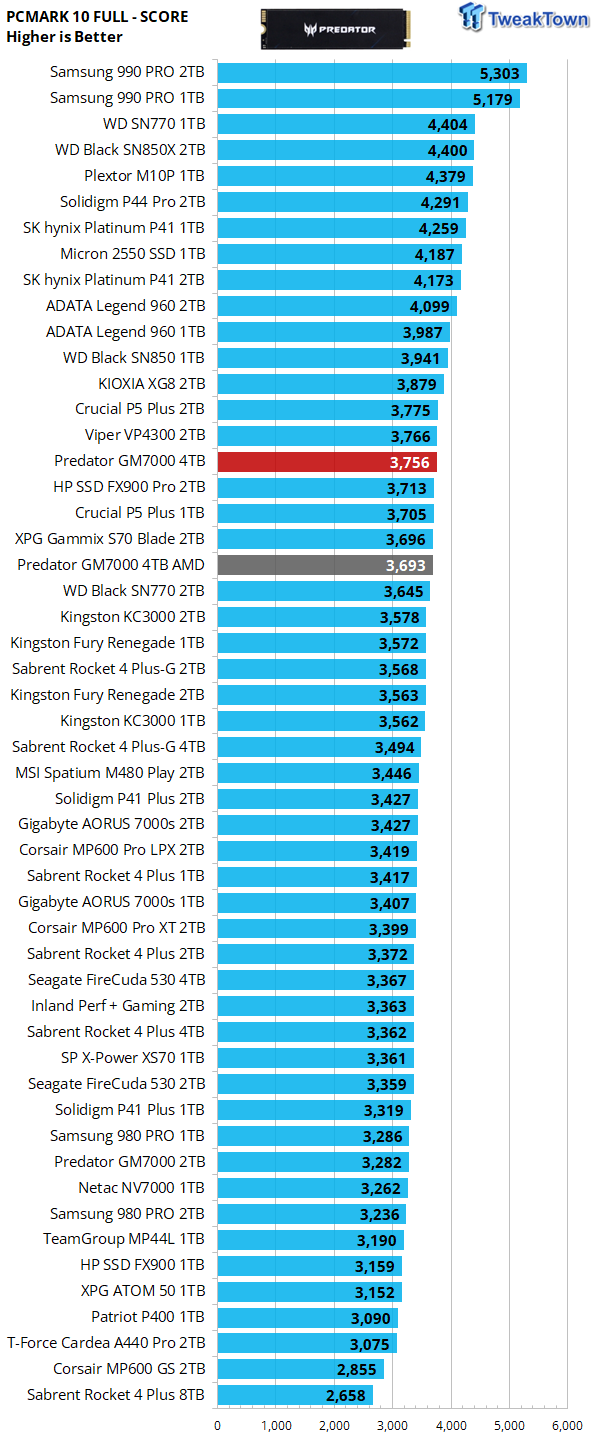
This particular test writes 204GB data and covers a broad range of common consumer tasks, including booting Windows 10, file transfers, Adobe and Office applications, and startup times for games, including Battlefield V, COD Black Ops 4, and Overwatch. Unlike synthetic numbers, this is comprehensive real-world data which is why we use it to rank SSDs in terms of user experience.
Our test subject delivers outstanding performance here, exactly as we have come to expect from this hardware combination. Once again, where performance matters most, the newly arrayed GM7000 greatly outperforms its predecessor.
PCMark 10 Quick System Drive Benchmark
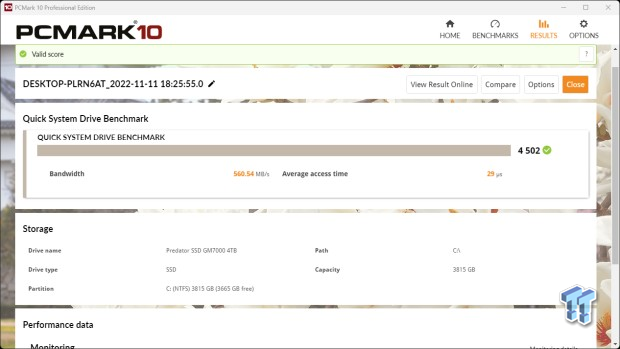
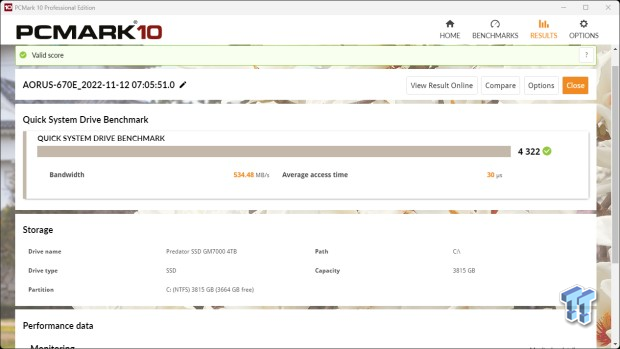
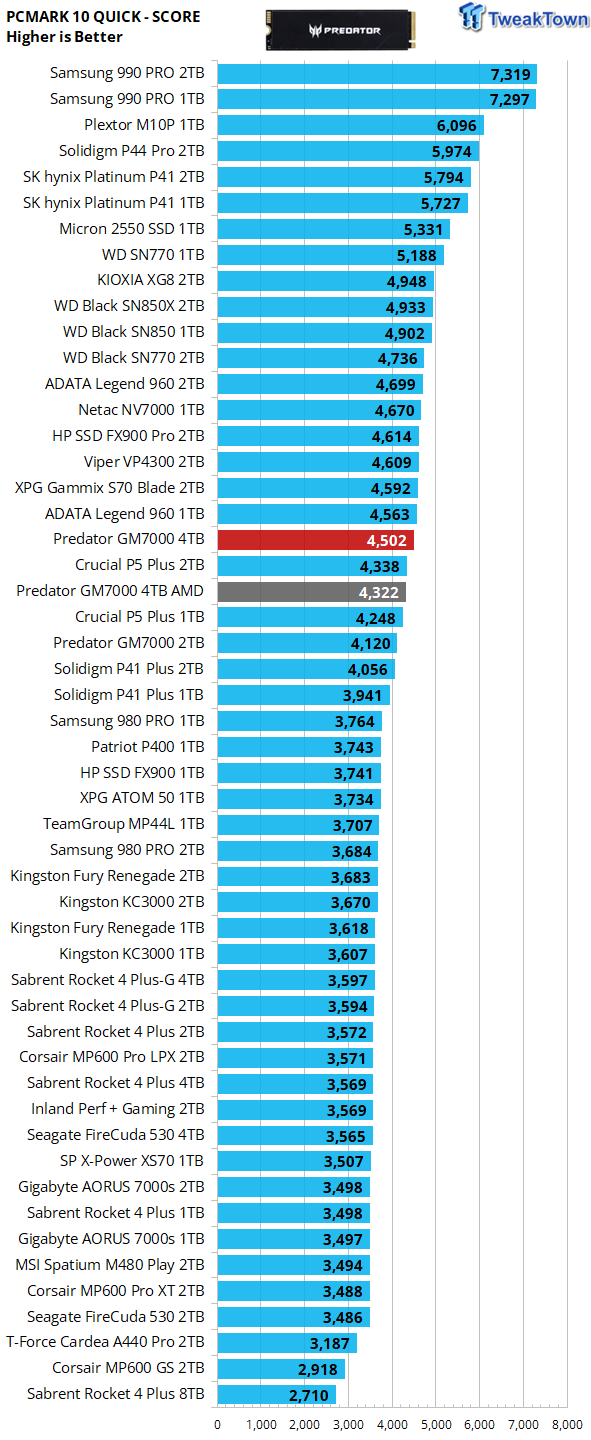
We consider a score of 4,500 here to be a milestone of sorts, a separation point if you will, that only TweakTown Elite Ranked SSDs can achieve. Impressive.
Final Thoughts
What a difference flash makes comes to mind after putting some numbers to our capacious 4TB test subject. The GM7000 series flash upgrade is a silent upgrade of sorts in that it's not advertised, but it's in there, and it's a difference maker, as evidenced by how much better our newly arrayed GM7000 performs than its EOL predecessor. It is the best overall performing over 2TB consumer SSD we've tested.
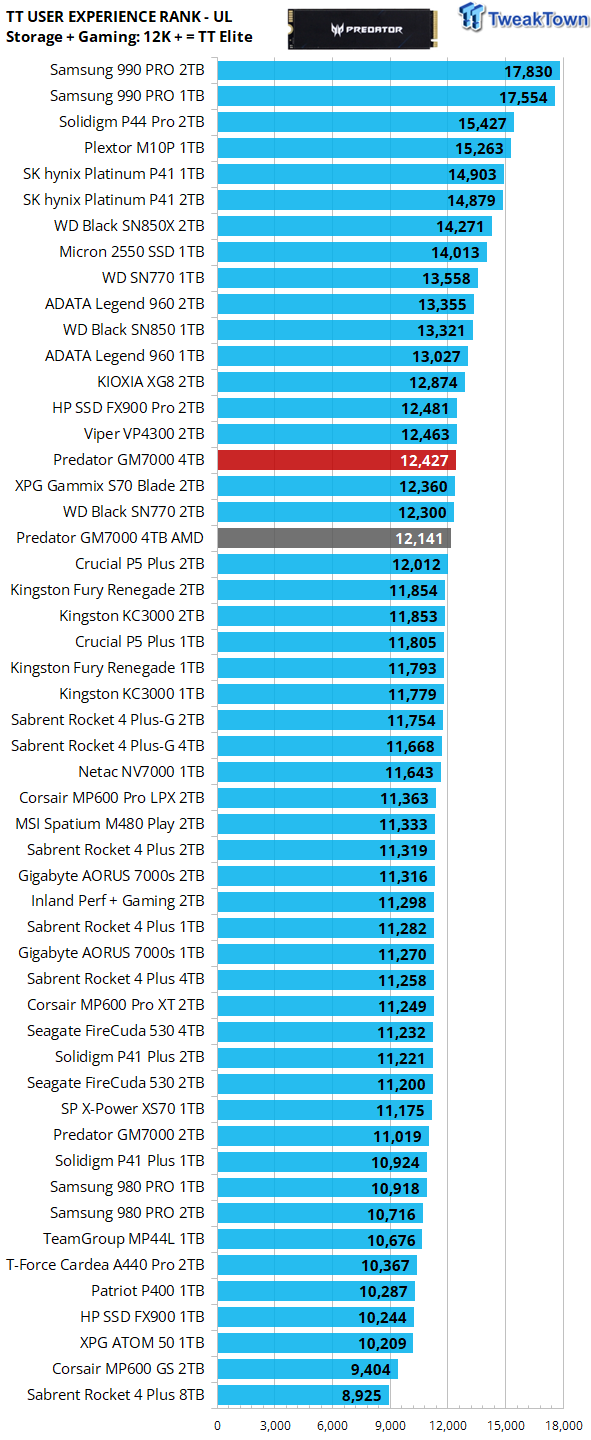
We rank SSDs in terms of overall user experience (performance where it matters most) as expressed by PCMark 10 storage and 3DMark gaming storage tests. We consider a user experience score of 12K or more to verify an SSD as a TweakTown Elite performer.
Acer's Predator GM7000 4TB is certifiably TweakTown Elite, with the distinction of being the first 4TB SSD to do so. Even more impressively, it can do so on both Intel and AMD platforms.
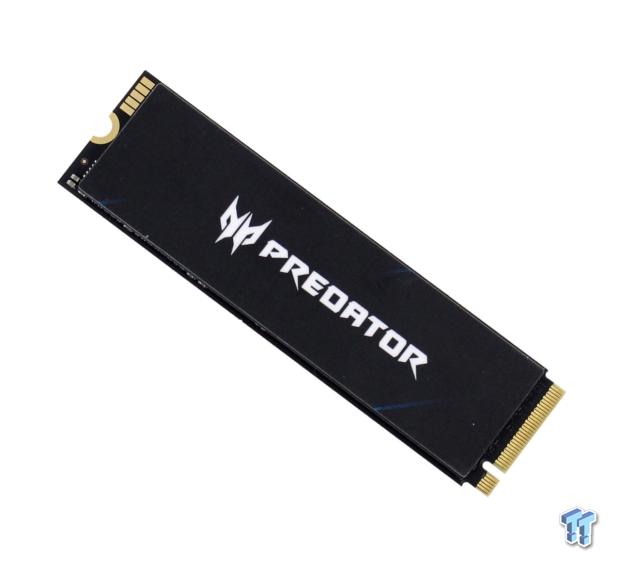
Acer's Predator GM7000 4TB SSD is, by extension, a testament to BIWIN's industry-leading flash packaging technology; so, hat's off to you, BIWIN, for stacking them 16 high and doing so efficiently. 4TB B47R flash for $450, certified TT Elite, and the best performing 4TB consumer SSD we've tested to date. Acer's GM7000 4TB checks all the right boxes, making it worthy of our highest award. Editor's Choice.

